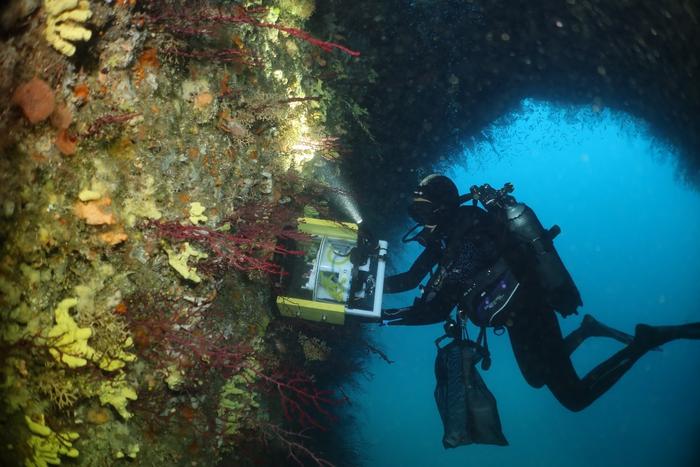Under the ocean’s surface, marine organisms are constantly releasing invisible molecules. Some of the chemical clues reveal which creatures are nearby, while others could be used someday as medications. Now, researchers in ACS Central Science report a proof-of-concept device that “sniffs” seawater, trapping dissolved compounds for analyses. The team showed that the system could easily concentrate molecules that are present in underwater caves and holds promise for drug discovery in fragile ecosystems, including coral reefs.

Credit: Adapted from ACS Central Science 2023, DOI: 10.1021/acscentsci.3c00661
Under the ocean’s surface, marine organisms are constantly releasing invisible molecules. Some of the chemical clues reveal which creatures are nearby, while others could be used someday as medications. Now, researchers in ACS Central Science report a proof-of-concept device that “sniffs” seawater, trapping dissolved compounds for analyses. The team showed that the system could easily concentrate molecules that are present in underwater caves and holds promise for drug discovery in fragile ecosystems, including coral reefs.
A drop of seawater is like a spoonful of dilute soup: It’s a complex broth of dissolved molecules from ocean-dwelling organisms. And to identify what’s in the mixture, scientists need to capture and concentrate these molecules. Yet, many underwater environments are threatened, especially those with unique — and potentially bioactive — compounds. So, Thierry Pérez, Charlotte Simmler and colleagues wanted to develop an underwater instrument that captures and enriches dissolved compounds produced by sponges or other marine organisms without harming their source and their ecosystem.
The researchers created a waterproof device that could be easily handled by an underwater diver and that could pump seawater through disks, which have a similar feel and thickness as make-up remover pads. These disks adsorbed dissolved molecules for subsequent analysis. They tested the instrument, called the In Situ Marine moleculE Logger or “I-SMEL,” in 65-foot-deep Mediterranean Sea caves that contained a variety of massive sponges. After sampling the water, the researchers assessed the captured compounds with mass spectrometry. The compounds had diverse elemental compositions, and many had molecular structures that are unknown, which the team says makes it promising for the discovery of new natural products.
Several metabolites, including brominated alkaloids and furanoterpenoids, captured from seawater were present in three sponge species that the researchers had examined in detail. And in some cases, the system concentrated compounds released by sponges. For example, aeroplysinin-1 was approximately 20 times more abundant in the extracts from seawater than within a yellow cave-sponge extract. The researchers say that “I-SMEL” represents a non-invasive way to capture molecules of interest to provide insights into an ecosystem’s health or detect novel molecules for future drug discovery efforts. The next step, they add, is to adapt the device for autonomous long-term seawater filtration and remote operation in deeper water.
The authors acknowledge funding from the French National Research Agency; Total Foundation; the Institute of Ecology and Environment from the National Center for Scientific Research for their First Support for Exploratory Projects; the Mission for Transversal and Interdisciplinary Initiatives of the National Center for Scientific Research; and the National Association for Technical Research.
The paper’s abstract will be available on Nov. 8 at 8 a.m. Eastern time here: http://pubs.acs.org/doi/abs/10.1021/10.1021/acscentsci.3c00661
The American Chemical Society (ACS) is a nonprofit organization chartered by the U.S. Congress. ACS’ mission is to advance the broader chemistry enterprise and its practitioners for the benefit of Earth and all its people. The Society is a global leader in promoting excellence in science education and providing access to chemistry-related information and research through its multiple research solutions, peer-reviewed journals, scientific conferences, eBooks and weekly news periodical Chemical & Engineering News. ACS journals are among the most cited, most trusted and most read within the scientific literature; however, ACS itself does not conduct chemical research. As a leader in scientific information solutions, its CAS division partners with global innovators to accelerate breakthroughs by curating, connecting and analyzing the world’s scientific knowledge. ACS’ main offices are in Washington, D.C., and Columbus, Ohio.
To automatically receive news releases from the American Chemical Society, contact [email protected].
Follow us: Twitter | Facebook | LinkedIn | Instagram
Journal
ACS Central Science
DOI
10.1021/acscentsci.3c00661
Article Title
In Situ Capture and Real-Time Enrichment of Marine Chemical Diversity
Article Publication Date
8-Nov-2023




